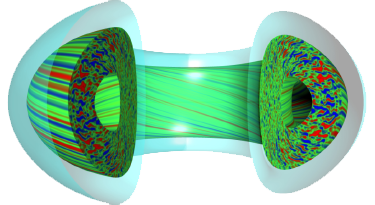Speaker
Description
Gaussian Process Regression (GPR) is a Bayesian method for inferring profiles based on input data. The technique is increasing in popularity in the fusion community due to its many advantages over traditional fitting techniques including intrinsic uncertainty quantification and robustness to over-fitting. Most fusion researchers to date have utilized a different GPR kernel for each tokamak regime. This requires a Machine Learning (or simpler) method to first predict the regime, choose the right kernel for that regime, and then use that kernel. The disadvantage of this method is that it requires an additional step, and it is unclear how well it will behave if the plasma enters a new, unexpected regime. We summarize our work developing a general kernel for all regimes (including radially-varying hyperparameters via a non-stationary change-point kernel), utilizing heavy-tailed likelihood distributions to automatically handle data outliers, and using GPFlow [1] for full Bayesian inference via Markov chain Monte Carlo to sample hyperparameter distributions. We present a single GPR method that is robust across many different tokamak regimes and a wide range of data inputs and quality.
[1] GPFlow: A Gaussian process library using TensorFlow. Journal of Machine Learning Research. 2017.
Work supported by US DOE under DE-SC0021203, DE-SC0021380, and DE-FC02-04ER54698.
| Country or International Organisation | United States of America |
|---|---|
| Affiliation | Tech-X Corporation |

